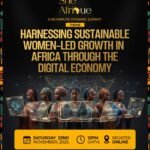Across laboratories, research centers, and universities on the African continent and beyond, African women are rewriting the narrative in science. Long underrepresented and often underestimated, they are now leading groundbreaking discoveries, influencing policy, and reshaping the global perception of who belongs in science.
From climate science and medical research to astrophysics and biotechnology, African women are not just participating — they are dominating.
From Margin to Mainstream: The Rise of African Women Scientists
For decades, systemic barriers like limited access to quality education, gender bias, and cultural expectations kept many African girls from pursuing science. But today, thanks to improved policies, grassroots advocacy, and sheer determination, African women are charting new paths in the scientific world.
Trailblazers like Professor Francisca Nneka Okeke, a Nigerian physicist who broke new ground in ionospheric and atmospheric research, and South Africa’s Professor Quarraisha Abdool Karim, a global leader in HIV/AIDS research, are now household names in scientific communities. Their contributions have laid the foundation for a new generation of scientists.
These women are not exceptions — they are the vanguard of a movement.
Leading Research That Matters
What makes the contributions of African women in science particularly impactful is their commitment to research that addresses the continent’s most pressing issues. Whether it’s finding sustainable agricultural solutions, combating infectious diseases, or mitigating the effects of climate change, African women scientists are developing homegrown, high-impact solutions.
Dr. Tolullah Oni, a Nigerian physician and public health researcher based in South Africa, is leading urban health research that informs how cities can be designed for better public health. Kenyan scientist Dr. Gladys Kalema-Zikusoka is a pioneer in wildlife conservation and zoonotic disease research, working at the intersection of human and animal health.
Their work reflects a deeply contextualized approach to science — one that prioritizes relevance, accessibility, and equity.
Investing in the Pipeline
The progress seen so far has not come by chance. Across Africa, initiatives aimed at supporting women in STEM are making a measurable difference. Programs like the African Women in Agricultural Research and Development (AWARD), the Next Einstein Forum’s Women in Science initiative, and mentorship networks like STEMi Makers Africa are nurturing talent from the classroom to the lab.
Still, challenges remain. A 2022 UNESCO report showed that while women make up nearly 30% of researchers in Sub-Saharan Africa, they remain underrepresented in leadership positions and high-profile research publications. Tackling these gaps requires targeted investment, policy reform, and a shift in societal attitudes toward women in science.
Redefining Global Science — On African Terms
African women in science are not merely participants in a global field — they are redefining it. Their unique perspectives, shaped by diverse cultures, lived experiences, and community-centered priorities, are enriching the scientific enterprise as a whole.
As the world grapples with global health crises, climate emergencies, and food insecurity, the insights and leadership of African women scientists are more crucial than ever. Their work is not only transforming their communities — it’s helping shape the future of science for everyone.
Conclusion: The Future is Female — and African
African women are no longer waiting for a seat at the scientific table — they are building new ones. And as their influence grows, so does the promise of a more inclusive, innovative, and impactful scientific landscape.
Their ascent is not just a milestone for Africa — it’s a global win for science.
Author’s Note:
This article honors the thousands of African women leading quietly and boldly in laboratories, on research expeditions, in classrooms, and in boardrooms. The future of science is brighter because of them — and it’s only just beginning.










